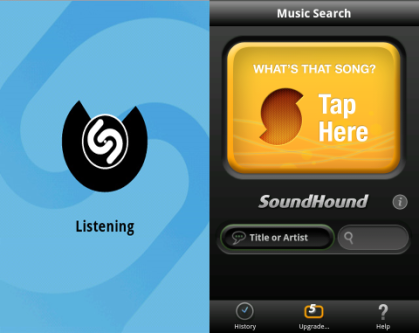Android App Showdown… Shazam vs Soundhound
 With the upgrade to a new phone as well as Android OS 2.1 & 2.2 in fairly quick successive deployment (at least for those of us not running rooted devices, grin), I found myself reinstalling and upgrading a lot of apps that I hadn’t paid much attention to lately. This included music identification software, Shazam. If you aren’t familiar with this sort of technology, it basically allows your phone to “listen” to music and identify the artist, track name, album, etc. Just the thing to figure out what that song playing in a cafe, radio or venue is.
With the upgrade to a new phone as well as Android OS 2.1 & 2.2 in fairly quick successive deployment (at least for those of us not running rooted devices, grin), I found myself reinstalling and upgrading a lot of apps that I hadn’t paid much attention to lately. This included music identification software, Shazam. If you aren’t familiar with this sort of technology, it basically allows your phone to “listen” to music and identify the artist, track name, album, etc. Just the thing to figure out what that song playing in a cafe, radio or venue is.
Shazam’s most apparent competitor is an app called Soundhound and as you’ll see not all applications are created equally.

Accuracy
Both Shazam and Soundhound rely on a “library” to identify the music the application samples. These libraries are massive and are not stored on your phone, so both require an active data connection. I tested both apps against a variety of music from new releases of popular artists, to more obscure versions (covers, remixes), older popular music, classics, traditional music, obscure artists and independent artists. As you might expect, both applications did much better with popular artists performing original versions of songs. However, Soundhound identified significantly more tracks than Shazam, particularly when it came to covers, remixes and independent/obscure tracks.
Victor: Soundhound
Speed
Both Shazam and Soundhound use an easy to see sampling meter and confirm completion of sampling with a friendly buzz/vibration which is a nice consideration in case you’re holding your phone up/out to get a better quality sample. There really is no comparison when it comes to speed, however. Soundhound consistently completed and identified songs in a fraction of the time as Shazam. Coupled with the superior accuracy, some users might consider the comparison over already, but as they say “Wait, there’s more.”
Victor: Soundhound
Features
Shazam and Soundhound leverage their identification functionality to encourage users to purchase music. I have no doubt they have affiliate relationships to profit from this, and I have no issues with that in a free application (see Value below though).Both offer some tertiary functionality like additional information about tracks and artists, but the real killer feature once again goes to Soundhound. With Soundhound you can hum or sing a song and it will try to identify it. While the accuracy of this varied greatly (I’m not renown for my singing ability) it does work.
Victor: Soundhound
Value
Both apps were available in a Free and Paid versions, and until recently Shazam had the solid edge with unlimited song identification. However, Shazam recently shifted to a Freemium model, limiting users to 5 songs per month. In doing so, they are matching Soundhound which uses the same limitations/model between their Freemium and Paid versions. Both applications apparently continue to get affiliate revenue if the users purchase a song through the applications. I personally think this is “double dipping” and would prefer either no ads/affiliates on the Paid versions of software OR the ability to specific an affiliate recipient of my choice (charity, special cause, etc).
Both Paid apps are ~$5 USD
Victor: Tie







Thanks…very helpful.
Have you seen this lab video testing the speed and accuracy of SoundHound vs. Shazam? Pretty much sums it up (results are platform agnostic): http://www.youtube.com/watch?v=zGlsnEnKFoI&feature=channel_video_title
Nice video, Jamie. Thanks for sharing it!